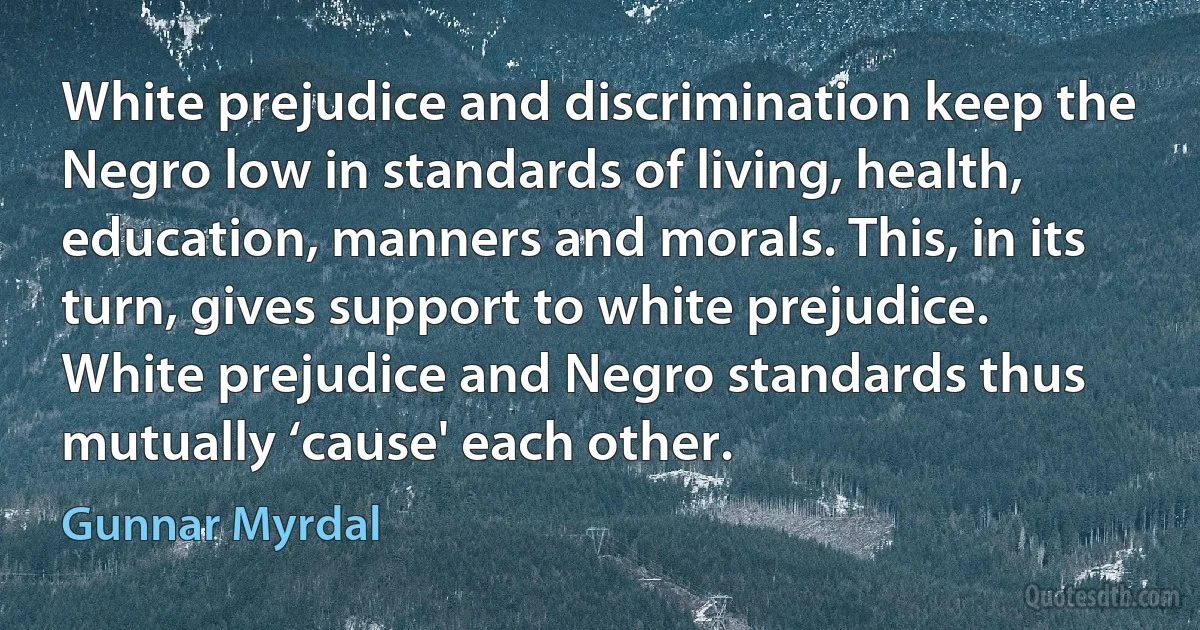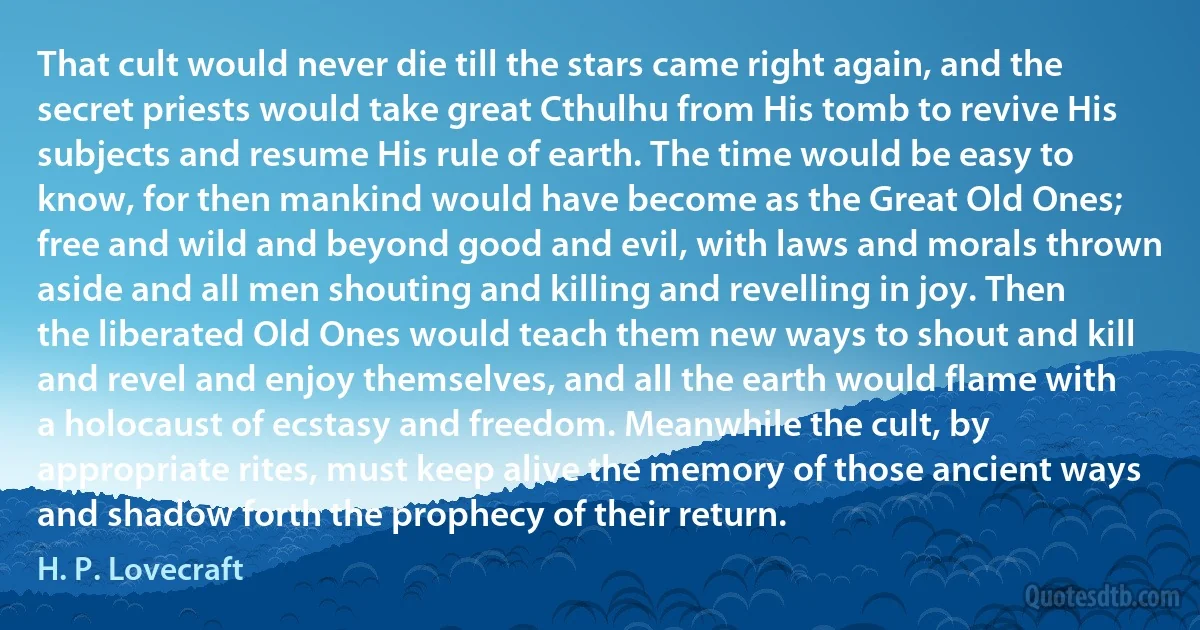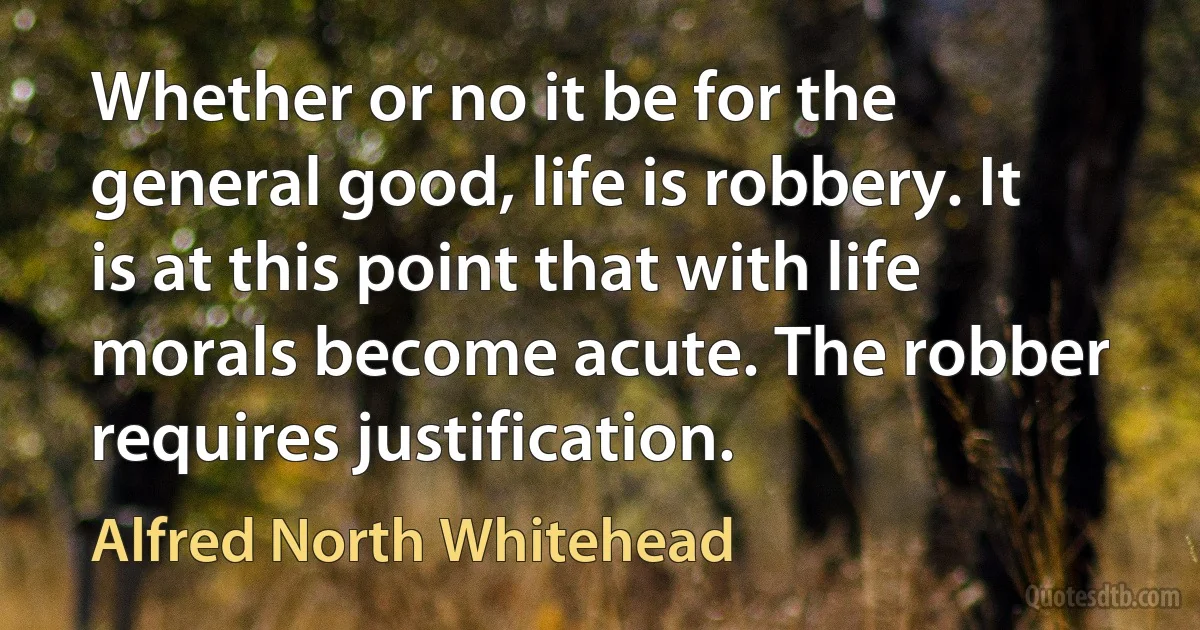Morals Quotes - page 6
Since the number of men is large but the earthly realm is not inexhaustible, one man can no longer profit from the labour of twenty. Moderation, contentment, and frugality must become the general morals of mankind. [...] The whole earth becomes a garden, and nature has at last completed her day's work here below, bringing permanent enlightenment, peace, and felicity together with the greatest possible number of men : she has anointed every man as his own judge, priest, and king; has turned the often-ridiculed tale of the golden age, mankind's favorite idea of old, into a reality by discreetly removing the eternal inequality of wealth, which has been ineffectively combated by all lawgivers and has always has crept back in, and which is the source of the decay of all nations, and the root of servitude, tyranny, and disunity among men, of venality and moral corruption, making it forever impossible through the excessive growth of the human population.

Adam Weishaupt
It is an advantage to all narrow wisdom and narrow morals that their maxims have a plausible air; and, on a cursory view, appear equal to first principles. They are light and portable. They are as current as copper coin; and about as valuable. They serve equally the first capacities and the lowest; and they are, at least, as useful to the worst men as to the best. Of this stamp is the cant of not man, but measures; a sort of charm by which many people get loose from every honourable engagement.

Edmund Burke
Do not let us imagine that discoveries in the world of the higher mathematics, of physics or biology are going to remove or even reduce our difficulties on the moral plane...The realm of morals is a world neither of quantity nor of chemical action. It is a world of values. It is precisely these values of right and wrong, of good and evil, of honesty and courage, which matter supremely for religion and national life...I am not despising science. I am only suggesting that moral values, eternal in their quality, transient in their form and application, are the foundation of a country's greatness. If moral values flourish in our common life all will be well with the nation.

Stanley Baldwin
What is the explanation of this evil reputation which attaches not to politicians of one party, but to the whole race? Primarily, I suppose, it is due to the fact that ever since States began to be they have been in peril and have trusted to force for their safety. War has been their normal history...With war and the preparation for war go the stratagems of diplomacy, the dropping of the ordinary code of morals, a holiday for truth, and an aftermath of cynicism...In the arena of international rivalry and conflict men have placed patriotism above truthfulness as the indispensable virtue of statesmen.

Stanley Baldwin
In the decade after the war Freud's theories dominated the narrow circles of British intellectuals. His psycho-analysis was accepted warmly for many reasons. It was new and exciting, it was shocking, it debunked religion and morals, it promised an internal liberation from all restraints. Nevertheless, it was essentially a creed of escape into an inner world of complexes and repressions and away from social and economic realities.

John Desmond Bernal
Let a man get once fairly possessed of any peculiar notion, whether it be on religion, political economy, morals, politics, arts, or anything else, and he sees little beside his beloved principle, which he is at all times ready to advance, defend, demonstrate, or expatiate on. Nothing can be simpler than the two great dogmas of Christianity, which are so plain that all can both comprehend them and feel their truth. They teach us to love God, the surest way to obey him, and to love our neighbor as ourselves. Any one can understand this; all can see how just it is, and how much of moral sublimity it contains. It is Godlike, and brings us near the very essence of the Divinity, which is love, mercy, and truth. Yet how few are content to accept the teachings of the Saviour in this respect, without embarrassing them with theories that have so much of their origin in human fancies.

James Fenimore Cooper
The powers, and faculties, and principles that are necessary fully to comprehend all that we see and all that surrounds us, exist and have been bestowed on man by his beneficent Creator. Still, it is only by slow degrees that he is to become their master, acquiring knowledge, step by step, as he has need of its services, and learns how to use it. Such seems to be the design of Providence, which is gradually opening to our inquiries the arcana of nature, in order that we may convert their possession into such uses as will advance its own wise intentions. Happy are they who feel this truth in their character of individuals! Thrice happy the nations which can be made to understand, that the surest progress is that which is made on the clearest principles, and with the greatest caution! The notion of setting up anything new in morals, is as fallacious in theory as it will be found to be dangerous in practice.

James Fenimore Cooper
Behold great Whitman, whose licentious line
Delights the rake, and warms the souls of swine;
Whose fever'd fancy shuns the measur'd pace,
And copies Ovid's filth without his grace.
In his rough brain a genius might have grown,
Had he not sought to play the brute alone;
But void of shame, he let his wit run wild,
And liv'd and wrote as Adam's bestial child.
Averse to culture, strange to humankind,
He never knew the pleasures of the mind.
Scorning the pure, the delicate, the clean,
His joys were sordid, and his morals mean.
Thro' his gross thoughts a native vigour ran,
From which he deem'd himself the perfect man:
But want of decency his rank decreas'd,
And sunk him to the level of the beast.
Would that his Muse had dy'd before her birth,
Nor spread such foul corruption o'er the earth.

H. P. Lovecraft
We should therefore, with grace and optimism, embrace NOMA's tough-minded demand: Acknowledge the personal character of these human struggles about morals and meanings, and stop looking for definite answers in nature's construction. But many people cannot bear to surrender nature as a "transitional object”-a baby's warm blanket for our adult comfort. But when we do (for we must), nature can finally emerge in her true form: not as a distorted mirror of our needs, but as our most fascinating companion. Only then can we unite the patches built by our separate magisteria into a beautiful and coherent quilt called wisdom.

Stephen Jay Gould
The riddle of life is simply this. For some mad reason in this mad world of ours, the things which men differ about most are exactly the things about which they must be got to agree. Men can agree on the fact that the earth goes round the sun. But then it does not matter a dump whether the earth goes around the sun or the Pleiades. But men cannot agree about morals: sex, property, individual rights, fixity and contracts, patriotism, suicide, public habits of health – these are exactly the things that men tend to fight about. And these are exactly the things that must be settled somehow on strict principles. Study each of them, and you will find each of them works back certainly to a philosophy, probably to a religion.

G. K. Chesterton
You are so careful of your boy's morals, knowing how troublesome they may be, that you keep him away from the Venus of Milo only to find him in the arms of the scullery maid or someone much worse. You decide that the Hermes of Praxiteles and Wagner's Tristan are not suited for young girls; and your daughter marries somebody appallingly unlike either Hermes or Tristan solely to escape from your parental protection. You have not stifled a single passion nor averted a single danger: you have depraved the passions by starving them, and broken down all the defences which so effectively protect children brought up in freedom.

George Bernard Shaw



